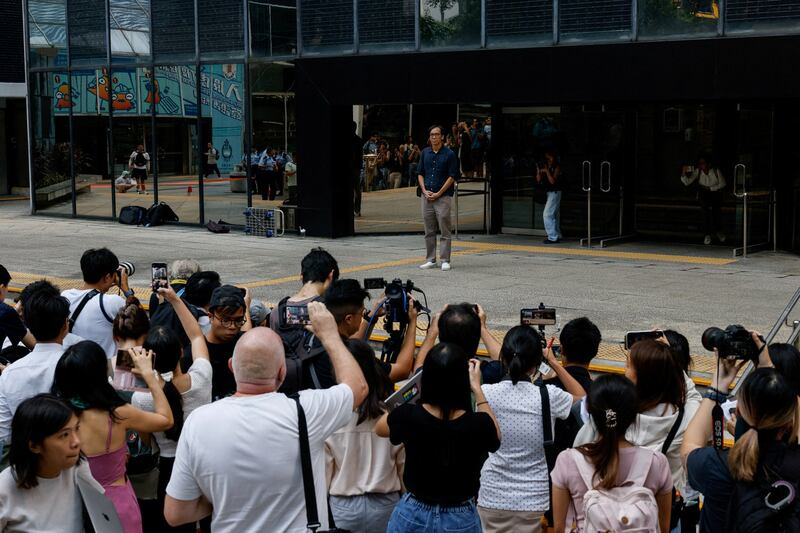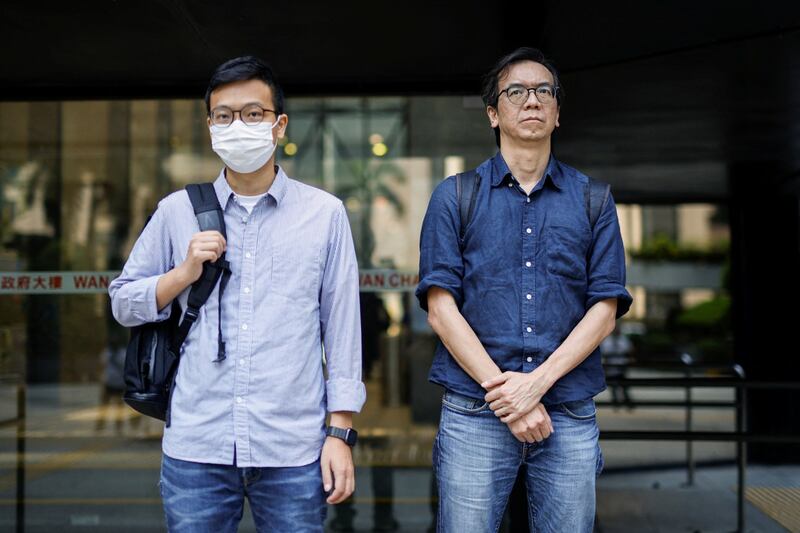UPDATED Aug. 29, 2024, 15:25 p.m. ET.
A Hong Kong court on Thursday found two editors of the now-defunct Stand News guilty of conspiring to publish seditious material, marking the first sedition conviction against any journalist since Hong Kong's handover from Britain to China in 1997.
The publication’s former editor-in-chief, Chung Pui-kuen, and former acting editor-in-chief, Patrick Lam, could face a maximum prison term of two years.
The journalists were charged with conspiracy to publish seditious material under a colonial-era law that has been increasingly used to target dissent as part of a crackdown that followed huge anti-government protests in the Asian financial hub in 2019.
Sedition laws were introduced during British colonial rule but had not been used until 2020 when China imposed new national security laws in response to the protests, which it blamed on outside interference.
Along with new crimes like “collusion with foreign forces” and subversion, prosecutors began charging Hong Kong people with sedition for the first time in more than 50 years.
The trial was initially expected to last 20 days but ran over to 56.
Hong Kong government lawyers said some of the articles published by Stand News helped promote "illegal ideologies," and smeared the security law and law enforcement officers.
During the trial, Chung, who pleaded not guilty, denied that Stand News was a political platform, and stressed the importance of freedom of speech, while Lam, who also pleaded not guilty, chose not to give testimony.

Stand News, founded in 2014, was one of the last openly critical media outlets in Hong Kong following the closure of the Apple Daily newspaper in June 2021.
During the 2019 protests, Stand News gained prominence for its live-streaming from the streets and for its critical reporting of the city authorities, who dubbed the publication "misleading."
In 2021, dozens of civil society groups shut in the city after China imposed a national security law, with many activists arrested.
Stand News was among the publications that shut down under the shadow of the law. On Dec. 29, 2021, police raided its office, arresting senior staff. Its assets were also frozen, forcing Stand News to cease its operations.
The pro-democracy Apple Daily was also forced to close following police raids on its newsroom and the freezing of its assets in the same year.
Jimmy Lai, the Apple Daily's founder, is on trial, accused of "conspiring to collude with foreign forces" and "conspiring to publish seditious materials."
The crackdown on Hong Kong's media has drawn criticism from rights groups and some Western governments. U.S. Secretary of State Antony Blinken described Stand News as "one of the few remaining bastions of free and independent media" in Hong Kong.
RELATED NEWS
[ Hong Kong High Court finds 14 democracy activists guilty of subversionOpens in new window ]
[ Hong Kong trade offices 'keep an eye' on 'anti-China' activitiesOpens in new window ]
[ Head of embattled Hong Kong journalists' union to step downOpens in new window ]
City leaders deny that the media has been targeted and stress the importance of preserving stability to protect Hong Kong’s economic success.
Days after Stand News shut down, another Hong Kong-based independent news outlet, Citizen News, announced it would cease operations, citing the deteriorating media environment and risks to its staff.
The closure of the Apple Daily, Stand News and Citizen News within months of each other dealt a blow to the city's once vibrant press scene.
In March, Radio Free Asia said it was closing its Hong Kong bureau, citing concerns for the safety of its staff in the city and actions by Hong Kong authorities, including referring to RFA as a "foreign force."

Some foreign news organizations have closed their offices, or moved out staff amid increasing scrutiny by the authorities.
The city's press freedom ranking fell from 73 out of 180 territories and countries in Reporters Without Borders' annual World Press Freedom Index to 135 last year, just above South Sudan.
“Once a bastion of press freedom, the Hong Kong Special Administrative Region of the People’s Republic of China has suffered an unprecedented series of setbacks since 2020, when Beijing adopted a national security law aimed at silencing independent voices,” the media watchdog said.
The Hong Kong government, while insisting that civil liberties are guaranteed in the city, has further tightened the sedition laws, which they say are necessary to ensure the media does not “endanger” national security.
In April, the city passed its own version of the national security law, known as Article 23, adding several new offenses, including treason, sabotage, and espionage, and allowing police to hold suspects for up to 16 days without charge. Sedition has also been added, and its scope expanded to include “inciting hatred” against the Chinese Communist Party.
The government says the provisions were similar to laws in places like the United Kingdom, Australia, and Singapore to tackle covert and overt foreign influence over political systems.
Edited by Mike Firn. UPDATES to add reference to RFA closing its Hong Kong bureau in March.
